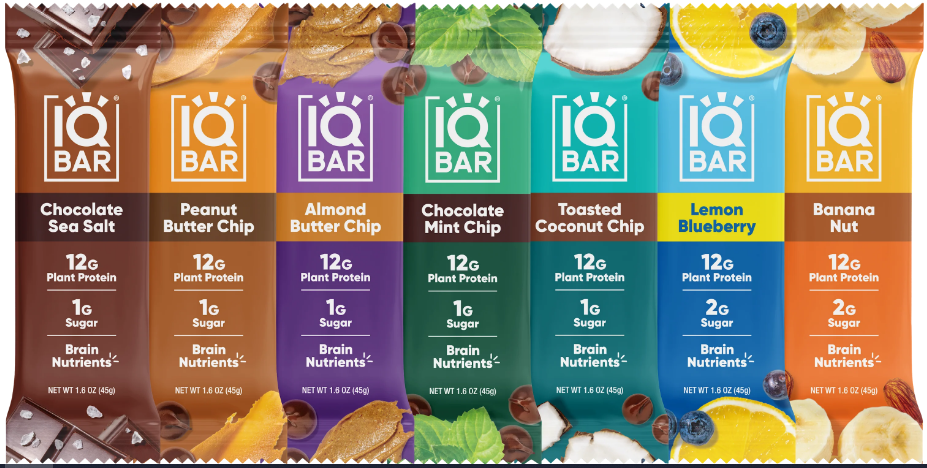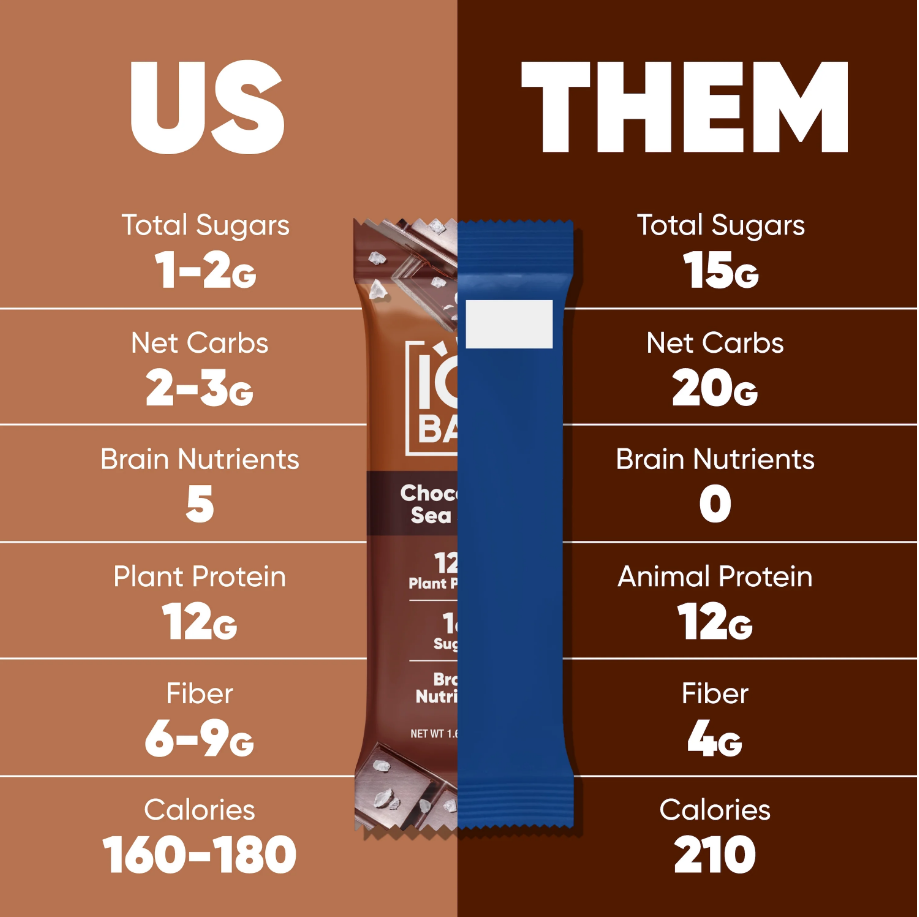Are IQ Bars Healthy? A Nutritionist Coach’s Review
Are IQ Bars Healthy? If you’ve seen these protein bars lining store shelves or trending online, you’ve probably wondered if they live up to the hype. Marketed as keto-friendly, plant-based, and packed with “brain-boosting” nutrients, IQ Bars are designed to appeal to health-conscious snackers. But are they actually good for you or just another cleverly branded protein bar? In this review, I’ll break down the nutrition facts, ingredients, and science behind IQ Bars so you can decide if they deserve a spot in your daily routine.
The Nutritional Foundation
One IQ Bar comes in at about 170–180 calories with a macronutrient split that leans high-fat, moderate-protein, and low-carb. You’re getting roughly 12g of plant-based protein, 7–8g of fiber, and only 1–2g of sugar (with near-zero added sugars). The net carbs land around 2–3g, making them keto-friendly. Sodium sits in the 135–190mg range, and you’ll get small amounts of vitamins and minerals like iron, calcium, and vitamin E.
From a clinical standpoint, that’s a solid nutritional profile, especially for anyone aiming to keep blood sugar steady, stay fuller longer, or follow a low-carb or high-fiber eating plan.
The “Brain Nutrient” Pitch
IQ Bars build their brand around six key brain-supportive ingredients: Lion’s Mane mushroom, MCTs, flavonoids, omega-3s, vitamin E, and choline. Each has some evidence linking it to cognitive support, but the exact dosages per bar are not disclosed—making it difficult to determine whether the amounts are clinically significant.
That said, I’ve noticed some subtle benefits when eating these consistently, especially in terms of mental clarity and my ability to maintain my focus after I eat one (which is one reason why I use mushroom powder in my coffee). This also lines up with emerging research on certain ingredients. Lion’s Mane, for example, has shown early promise in promoting nerve growth factor and supporting memory and attention in small human studies. Omega-3 fatty acids (particularly DHA) have long been linked to brain health, and new findings continue to suggest their role in cognitive resilience and mood regulation.
The science is still evolving, and while one bar won’t transform brain function, the inclusion of these nutrients does give IQ Bars a potential edge over standard protein bars.
Where They Shine
From a nutrition coach’s perspective, these IQ bars have a lot going for them:
Low sugar and net carbs help avoid energy crashes and spikes in blood glucose.
The fiber-plus-protein combination promotes satiety and may support better appetite control.
They’re compatible with a wide range of diets including vegan, paleo, keto, gluten-free, dairy-free, soy-free, and non-GMO.
They don’t contain seed oils (a rare thing for protein bars).
They have a lot of flavors including chocolate sea salt, almond butter chip, lemon blueberry, banana nut, wild blueberry, matcha chai, toasted coconut chip, and my favorite peanut butter chip.
They’re affordable. IQBARs aren’t overpriced like a lot of other protein bars, coming in at around $2/bar (less if you use the MINDBODYDAD promo code or buy in bulk).
Potential Drawbacks
They’re not perfect. The protein content, at about 12 g per bar, is on par with the average protein bar, but I’d prefer to see a bit more, especially for those using these as a post-workout recovery option. IQ Bars aren’t widely available in brick-and-mortar stores, so you’re often stuck ordering them online, sometimes in bulk.
The Verdict
Yes, IQ Bars can be considered a healthy snack option. They check the major boxes for balanced macronutrients, low sugar, and clean ingredients. The brain health claims, while intriguing, aren’t backed by clear dosage data, so it’s best to view them as a smart snack, not a cognitive miracle worker.
If your goal is steady energy, satiety, and a plant-based protein source without the sugar crash, IQ Bars are a strong choice. Just remember: the healthiness comes from their overall nutrition, not the marketing hype around instant brainpower.
If you’re interested in IQBAR, use the promo code MINDBODYDAD to get 15% off (good for their IQMIX also).
FAQ
How long do IQBARs stay fresh?
Unopened, they have a shelf life of 12 months. Once opened, it's best to consume them within a few days for optimal freshness.
What protein sources do IQBARs use?
IQBARs primarily rely on almond butter and whey protein for their protein content. Some flavors also include pea protein as an additional source.
Do IQBARs use artificial sweeteners?
No, IQBARs rely on natural sweeteners like stevia and monk fruit extract, which are zero-calorie options.
What makes IQ Bars different from other protein bars?
Their standout feature is the inclusion of “brain nutrients” like Lion’s Mane mushroom, omega-3s, MCTs, and vitamin E. While the dosages may be modest, these ingredients set IQ Bars apart from more conventional protein bars.
Where can I buy IQ Bars?
IQ Bars are available online through the brand’s website. They have increasing visibility in stores as well although not as much as I would hope.
Do IQ Bars contain caffeine?
Most flavors are caffeine-free, but a few (like certain chocolate or coffee-inspired options) may have small amounts from natural ingredients like cocoa or coffee powder.
Are IQBARs suitable for kids?
While generally safe for children, some flavors may contain ingredients like caffeine or stevia that parents may prefer to limit.
Related:


